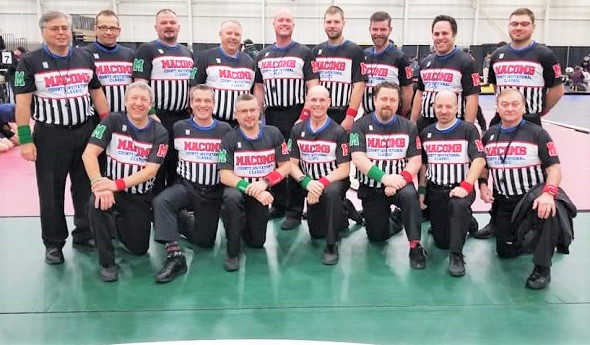
The Official View: Don't Make it Personal
By
Brent Rice
MHSAA Assistant Director
January 15, 2019
By Brent Rice
MHSAA Assistant Director
Statistics tell us poor sportsmanship is a leading factor in officials leaving officiating and a major impediment to recruiting new officials. The official catching flak is not new.
This week’s “It’s Official” discusses work being done to bring civility to high-intensity situations where criticism of officials has frequently turned personal.
It’s Official!
Poor Sportsmanship and the Official
 As long as there have been officials, there has been dissatisfaction with officials by players and coaches. It’s not that instances of poor sportsmanship are becoming more frequent – it’s that these instances are becoming more personal. And in part because of the accessibility of social media, they are more sensationalized.
As long as there have been officials, there has been dissatisfaction with officials by players and coaches. It’s not that instances of poor sportsmanship are becoming more frequent – it’s that these instances are becoming more personal. And in part because of the accessibility of social media, they are more sensationalized.
The great Major League Baseball veteran umpire Harry Wendelstedt regularly used to say, “You may yell at the uniform, but you can’t yell at me.” His point recognizes not everyone will agree with the calls officials make, but that criticism and disapproval should be directed about the call and not about the person.
Some sports have ejectable offenses specific to that sport. Others – think soccer, volleyball, basketball or football – have a progressive system of fouls that lead to an automatic ejection. This doesn’t mean, though, that coaches and players receive a one-time free pass to say whatever they want. Personal attacks are not permitted and are grounds for immediate disqualification. Personal attacks include:
• Offensive or derogatory remarks about an official’s (real or perceived) gender, ethnicity, sexual orientation, age, religion or disability.
• Threats or intimidation of physical violence, withdrawing games or a downgrade of ratings.
• Personal insults that disparage an individual or openly question an official’s integrity, impartiality, honesty or character.
For example, instead of using the personal insult “You’re terrible!” that would result in an immediate ejection, players and coaches could substitute the impersonal “That’s terrible!” The use of “you” or “you’re” personalizes the attack, and anything that follows those words in a disparaging manner almost always will result in a disqualification.
While the onus of ensuring good sportsmanship is primarily the responsibility of administrators, coaches and players, the officials also play a significant role by enforcing behavior and conduct rules through penalization. Officials are being instructed to strictly enforce this policy moving forward. To emphasize the importance of avoiding personal attacks on officials, the MHSAA will be starting the new campaign “Get Personal … Get Ejected!” We are looking for help from coaches, players and spectators in showing respect and appreciation for the hardworking men and women who officiate MHSAA contests by keeping criticisms brief and absent of personal attacks.
 Sports Officials Appreciation
Sports Officials Appreciation
The MHSAA is seeking ways we can show appreciation for the contribution Registered officials provide to the MHSAA and its member schools. This will soon include the introduction of an “Official Thanks” campaign and providing schools a framework to institute “Officials Appreciation” events.
To further express our gratitude, the MHSAA has partnered with the Detroit Red Wings to host a Sports Officials Night on Sunday, March 31 beginning at 7:30pm. The package includes a specially-priced Red Wings ticket, souvenir cooling towel and access to a pre-game speaking engagement with former professional officials. Additional benefits also are being worked on. Details are posted on the Officials page of the MHSAA website and will be delivered to all officials via email.
Rule of the Week
GIRLS COMPETITIVE CHEER As Team A attempts a swinging stunt during Round 3, the flyer is propelled into an almost-vertical position with her feet in the air and head near the floor.
Ruling: This is an illegal stunt and an 8-point deduction per infraction.
It’s Your Call
BASKETBALL This week’s clip shows Team A in white attempting to move the ball up court against Team B’s press. A pass is made to #11 near the division line. What’s the call?
Last IYC Ruling: In the last “It’s Your Call” clip, the attacking wrestler picks up his opponent and slams him to the mat. This is a dangerous act, and a flagrant misconduct should have been assessed. (Click to see video.)
Official View: Giving Back
Every year, the Macomb County Coaches Association and area officials come together to host a Christmas Tournament where funds are raised for educational scholarship opportunities. This year’s event was another huge success.
For officials, it’s a great time to give back and enjoy the sport they love. Tradition has been that custom uniform shirts are purchased for the officials, who also wear their best (or worst) pair of Christmas socks.
Pictured above are: (Back row) Phil Lieblang, Lenny Gino, Chad Davinich, Dave Hall, Bryan Legree, Josh Orzechowski, Mike Billiu, Matt Stabley, Brandon Orzechowski. (Front row) Eugene English, Gary Kowalewski, Jerry Angelo, Ron Minoletti, Rob Peltier, Eric Siefert, Jim Niemiec.

Timeout to Appreciate Officials
September 23, 2013
By Kevin Wolma
Hudsonville athletic director
Wolma is in his third school year as athletic director at Hudsonville and previously coached basketball and golf. Below is a recent “30-second timeout” he wrote for the Hudsonville district newsletter.
We were five seconds away from one of the greatest upsets in the history of Caledonia basketball.
During the regular season, South Christian had beaten us by more than 30 points on two different occasions. The District Finals became the site for the third contest between the two schools on a warm March day.
We were able to slow them down just enough to stay within striking distance until late in the fourth quarter, when we finally took the lead for the first time. South Christian had one last chance with seven seconds left on the clock. After a timeout, they in-bounded the ball from the sideline and their player forced up a shot. I could see it was going to be short from my viewpoint, and my heart began to race with adrenaline as I could sense the impossible was going to become possible.
What happened next has stuck with me for the rest of my life, as one of the South Christian players pushed one of our players in the back, grabbed the rebound, and put the ball in the basket with one second left.
Game over. South Christian wins the District championship.
For the next eight years as a varsity basketball coach, I held a grudge against officials for that one call. Twelve years later, after I was done coaching, I went back and watched the game over again for the first time. I almost turned the video off when they in-bounded the ball in those last seven seconds because I did not want to relive that moment and the ensuing emotions that took place.
While watching I discovered something.
The South Christian player did not shove my player as much as I thought, and our players did not box out like I had thought, which made it easier for them to get the rebound and score. Looking back, did I even tell my players to box out during that last timeout before the ball was in-bounded?
At that moment it became very clear to me that what we see during a game may be clouded because we want our team to gain every advantage and every call in order for them to be successful. Perception is not reality. Officials are human. They will make mistakes just like the coaches and players do during a game.
There still has never been a game that has been decided by an official. Some people will say that the Class B Semifinal boys basketball game (in 2010) was decided on an official’s call when they ruled one of Forest Hills Northern’s player's foot was on the line on his last-second shot when in reality his foot clearly was behind the line. That call cost them a chance to play in the (MHSAA) Finals.
Coach Steve Harvey was quoted in the paper as saying, "We had opportunities to take care of the game before it even came down to that shot.” In the moment it seemed like that one play cost Forest Hills Northern the game, but there were over 50 possessions on offense and defense that preceded the play and potential outcome.
Having the opportunity to spend time with officials inside the locker room has made it very evident they are serious about their jobs and calling the best game they can. I have had requests from officials to have a monitor available to break down film an hour and a half before their contest begins to see strengths and weaknesses in their placement and mechanics from prior contests. I have had officials upset at halftime or after a game because they realized they made a mistake. I have had officials contact me personally after a game to apologize for a call made during the contest.
In the business world and also in education we use the word collaboration a lot. Officials collaborate before, during, and after every contest to garner more knowledge so they can continue to improve.
This is not even their full time job. Officials do what they do because they love the game and want to give back to the sport that made an impact on them.
The next time we are at a game and we think the officials missed a call, let’s take a 30-second timeout to gather our emotions so we do not say anything we will regret later. Instead let’s spend our energy cheering on our teams to be the best they can be.

